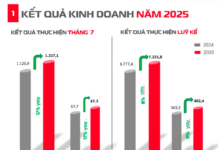This creates a positive situation for innovation and development in the banking sector, highlighting their flexibility and ability to adapt to the challenges of today’s market.

Commercial lending: The increasing demand for business loans provides banks with a good opportunity to increase commercial lending revenue. However, to compete effectively, they need to streamline cumbersome loan application processes. According to a study by S&P Global, nearly half of medium-sized businesses find the loan application process too complex, leading them to seek alternative lenders.
Banks can simplify and significantly expedite commercial lending processes by leveraging technology, including digital portals, AI-provided credit risk analysis, and API integration with accounting software.
Lending to small businesses represents a promising growth path, especially as platforms like Stripe, Square, and PayPal are actively expanding their presence. By harnessing technology, reimagining processes, and implementing flexible strategies, banks can capitalize on these opportunities and thrive in an ever-developing financial landscape.
Asset management: The asset management landscape presents a significant opportunity, with over $68 trillion in generational asset transfers currently underway. However, tapping into this potential requires a carefully coordinated strategy that combines personalized advice and advanced digital capabilities. As emphasized by McKinsey’s research, establishing a high-tech/high-touch omnichannel advisory service model is crucial in this endeavor.
Leading asset management services consistently deliver two to three times higher profits and revenue growth than average services. To achieve this level of excellence, banks are increasingly attracting registered investment advisors (RIAs) to enhance their credibility and build an automated investment platform.
The convergence of human and robo-advisory services sets the stage for comprehensive omnichannel offerings. Integrating financial planning, investing, and lending provides a holistic view of a client’s financial landscape. Banks successfully executing this strategy will capture exceptional growth opportunities in the asset management field.
Services for small businesses: Small businesses represent a significant growth avenue for banks, but realizing this potential requires more than just offering a basic business checking account. Banks can establish themselves as true financial centers for small business customers by providing an integrated suite of products and services. This comprehensive approach would encompass banking, payments, accounting, payroll, insurance, and more, all seamlessly integrated on a unified platform.
According to JD Power research, only 29% of small businesses feel that banks truly understand their specific needs. Part of the issue is many customers work with different financial institutions, each providing relevant services, but no one has a complete picture of the small business customer. Gilbert notes, “I don’t see many underserved businesses, but I see a lot of over-banked businesses.”
To bridge this gap, banks must tailor solutions to address all the unique challenges small businesses face, including cash flow management, supplier payments, access to capital, and minimizing administrative burdens. Collaborating with fintech partners proficient in areas such as accounting, invoicing, and payments can enhance the value proposition of banks and meet the diverse needs of small business customers, making them less likely to fragment different parts of their financial services needs.

Banks can establish themselves as true financial centers for small business customers by providing an integrated suite of products and services (illustration).
International expansion: Developing regions like Southeast Asia and Latin America represent promising growth frontiers for banks, fueled by increasing incomes and growing adoption of financial services. Ensuring a first-mover advantage is crucial when facing fierce competition. Banks can focus on specific opportunities in a country, such as the emerging middle class in Mexico or Vietnam’s digitally-savvy population.
Adapting products and distribution to suit local customer needs and regulatory nuances is essential for successful international expansion. Partnering with or acquiring companies in the region may provide favorable conditions for market entry and assist in navigating legal regulations. According to Bain research, developing market opportunities have the potential to contribute 25% of global revenues for leading banks by 2024.
Responsible innovation: As technology advancements accelerate, striking a balance between innovation and responsibility becomes increasingly important for banks. While pushing the boundaries, banks must also maintain depositor confidence and financial stability. Strong regulatory frameworks must ensure that ethical considerations and security principles guide the application of new technologies.
Most importantly, recognizing that without the accountability constraints of human oversight, technology progress runs the risk of being misused with unpredictable consequences. Future financial institutions need to focus on responsible innovation, surpassing current limitations while evaluating the wisdom of those advancements. Guiding artificial intelligence with human values will play a crucial role, as well as establishing stringent regulations to encourage innovation and safeguard community interests.
By combining ambitious technology with a steadfast commitment to community benefit, banks in 2024 can play a pivotal role in profoundly improving the financial lives of customers and society. Responsible innovation will be the foundation for the banking industry’s success in the future.
Reference: The Financial Brand
Compiled by DTSVN author team – Digital Transformation Solutions Vietnam – Finance-Banking industry.



































